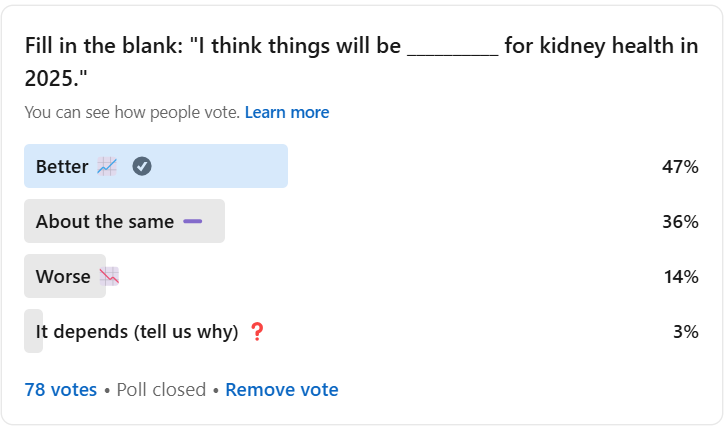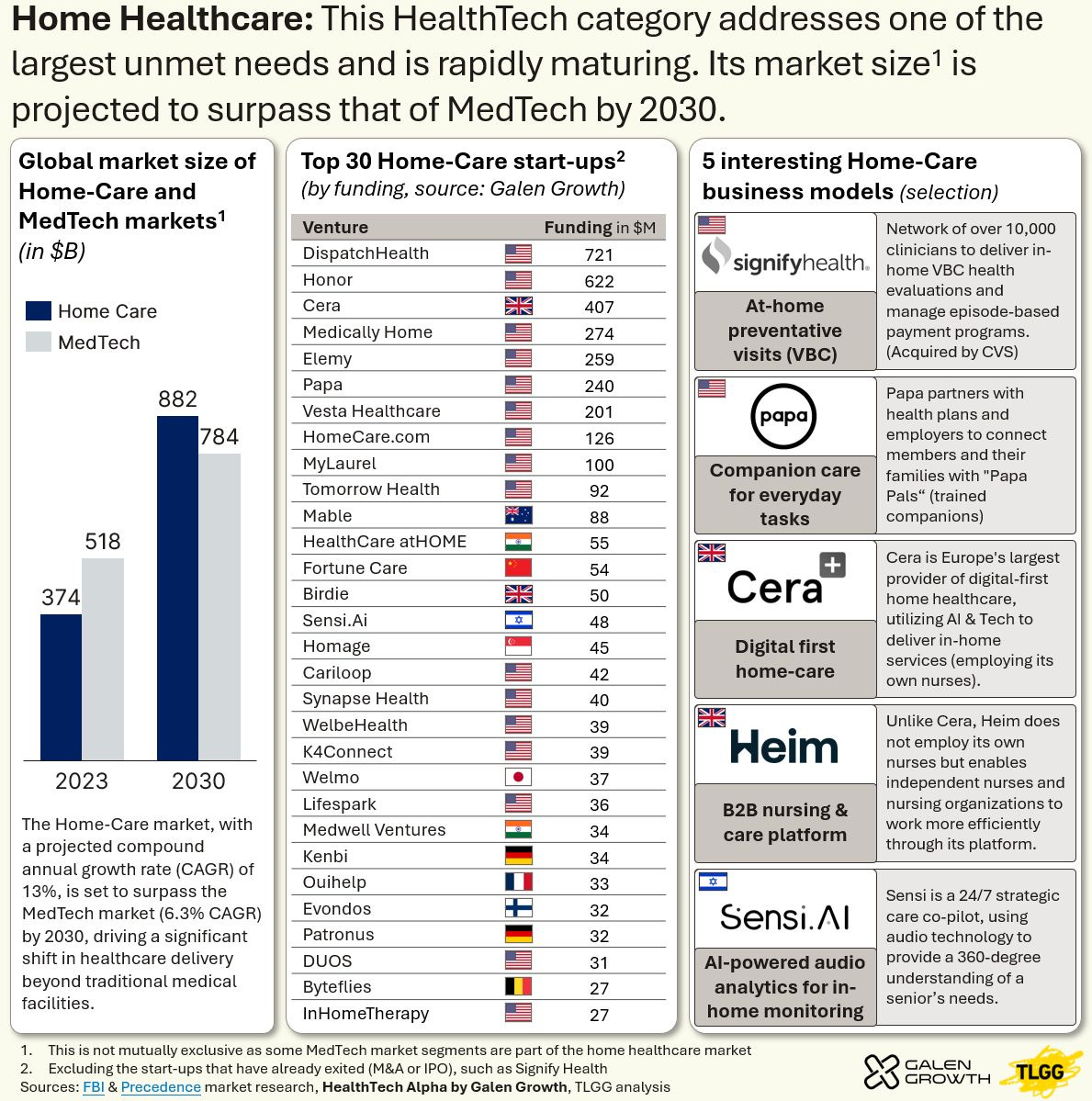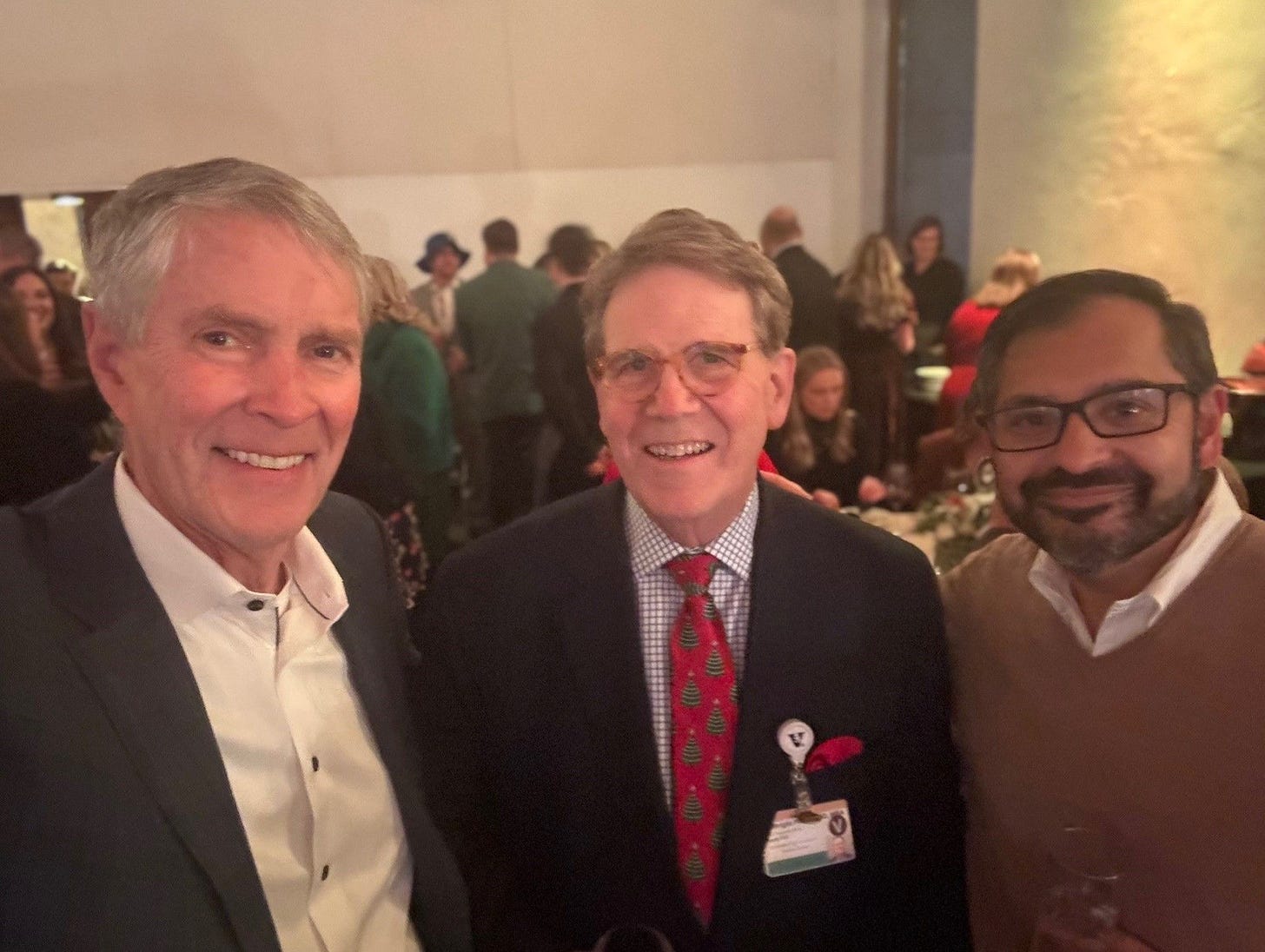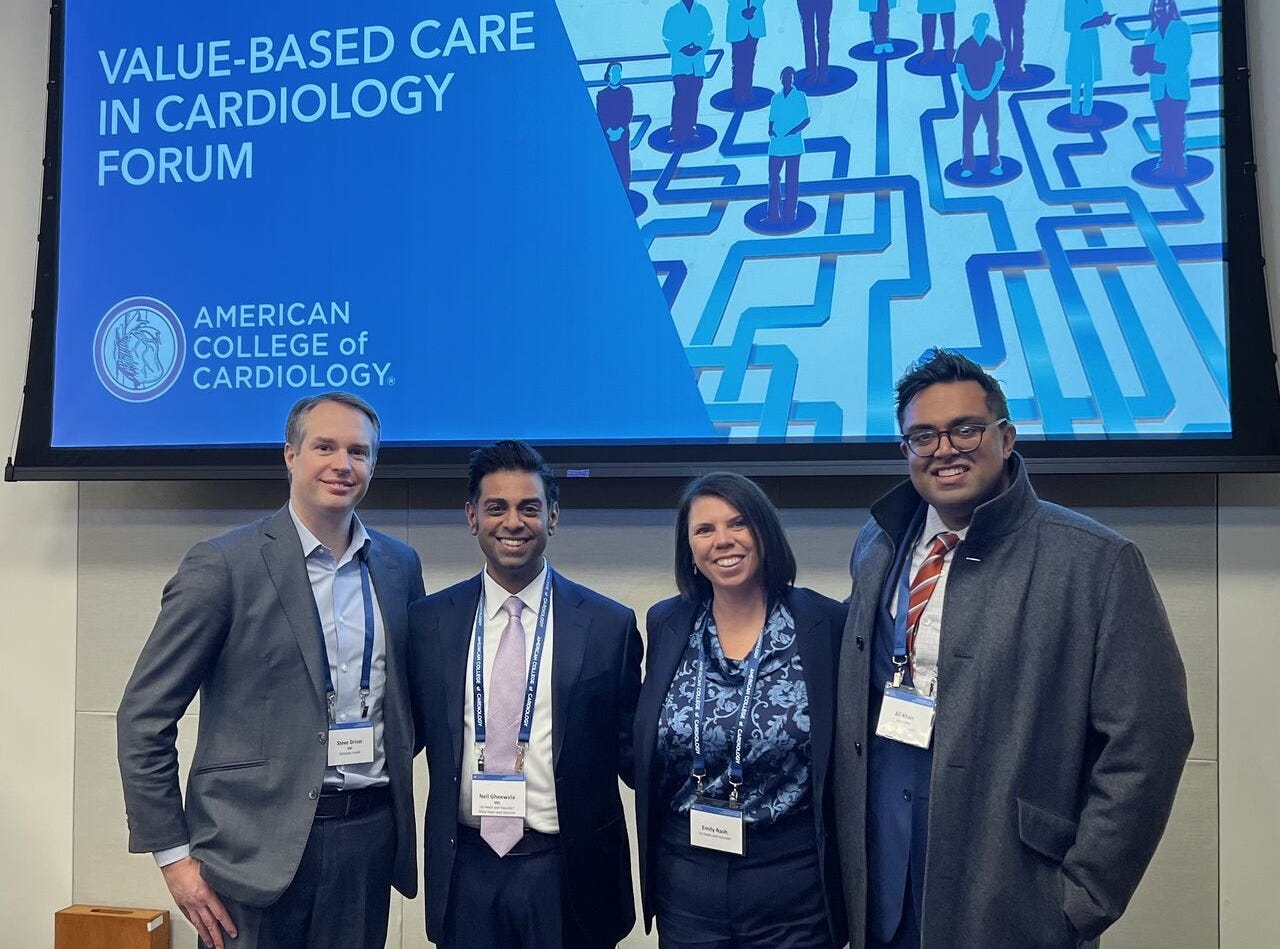Signals Weekly: IOTA is Coming; HDF's US Debut; iBox Gets FDA Nod; Predictions & 2024 Wrap-Up
Your weekly collection of news, research, funding & community voices shaping the future of kidney care.
This will be my final news recap for 2024. As the year winds down, we’re reflecting on the key themes shaping the future of kidney care. From the iBox scoring system advancing transplant endpoints to the new payment model launching in July, it's clear that innovation in transplantation will continue to guide us well into 2025. Today, we’ll also explore how technologies like hemodiafiltration and AI-enabled tools are set to redefine dialysis and chronic care in the U.S. At the same time, we’ll look at how challenges such as getting new transplant programs off the ground, muscle preservation with GLP-1 drugs, and medtech layoffs show that innovation often requires taking a step back before moving forward, and vice versa.
We’re also excited to announced our new Slack channels for subscribers, offering spaces to meet your peers, ask questions, and discuss topics like transplant, home dialysis, managing early CKD, vascular access, VBC, devices, and more. And speaking of ways to meet and connect with fellow explorers, don’t forget to check out the 2025 conference survey we sent out on Friday—share your plans and help highlight events others should consider as we prepare for the year ahead!
Thank you for being here this year, for supporting this labor of love, and for all you do for those in your orbit and this community. Keep exploring.
—Tim
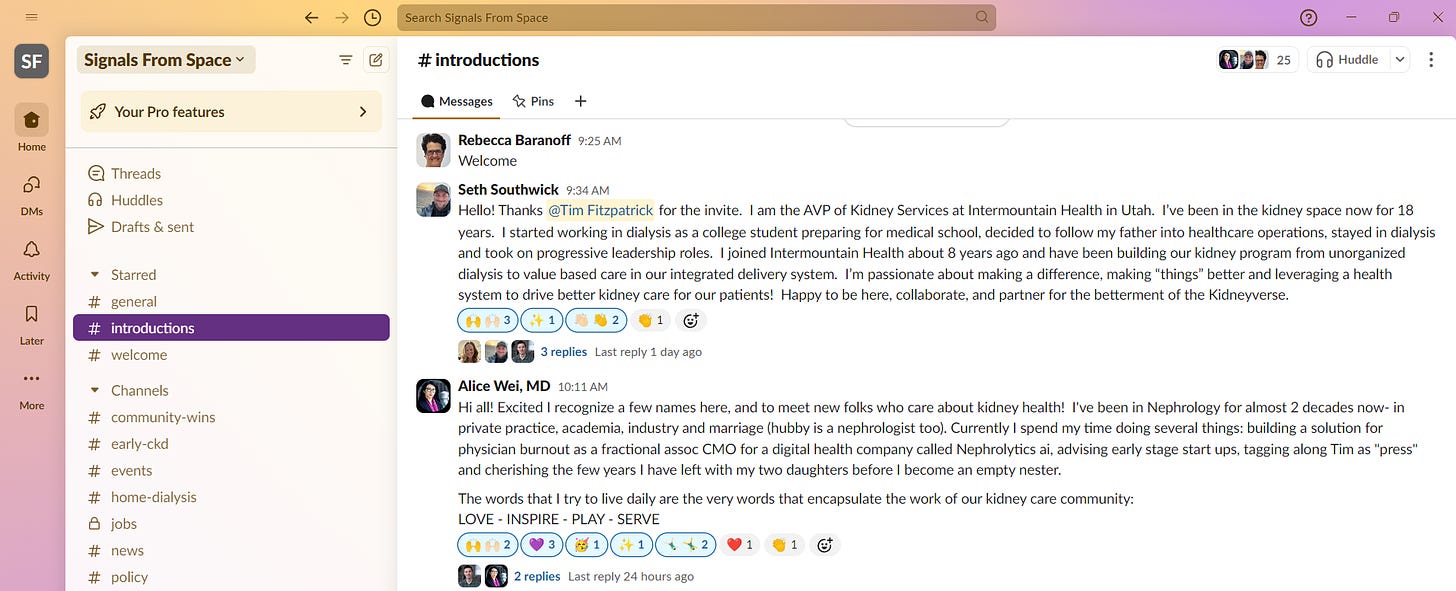
This week
Poll: How are you feeling about kidney health?
CMS finalizes IOTA model, starting July 1, 2025
Hemodiafiltration’s U.S. launch: a new chapter
Baxter restarts dialysis production lines post-Helene
Akebia’s VOICE trial starts for CKD anemia
BVP: AI drives health tech recovery into 2025
Venrock predicts AI struggles, M&A in 2025
Carilion kidney transplant opposition in VA
BK virus study reveals new drug targets
GLP-1 drugs linked to muscle loss risks
Home care startups scaling with AI tools
Medtech layoffs surpass 22,000 since 2022
New strategies emerge for advanced kidney cancer
Glucose monitoring predicts bradycardia in CKD patients
& more…
This edition of Signals was made free for all readers thanks to Roivios, the team developing the world’s first renal assist device. Check out JuxtaFlow, a clinical-stage solution for renal insufficiency. Thanks team!
Weekly Poll
In this week's poll, we’d love to hear your thoughts on kidney care in 2025. How are you feeling about the challenges on your plate and the larger kidney care ecosystem over the next 12 months?
I was glad to see many of you are feeling optimistic about the year ahead. At the same time, some of you shared that you expect things to remain about the same. When it comes to real, demonstrable changes—especially in areas like early CKD detection, management, and the dialysis system—many of us remain (understandably) less optimistic.
Back in January, I wrote a piece about 16 key events I thought might shape kidney care in 2024. Some were spot on, while others were a surprise. I’m planning to update this list for 2025, so let me know which events are top of mind for you and what you expect to see in the year ahead.
Signals
CMS issues final rule for mandatory organ transplant payment model
The Centers for Medicare & Medicaid Services (CMS) finalized the Increasing Organ Transplant Access Model, a mandatory six-year payment program aimed at improving kidney transplant access for end-stage renal disease patients while preserving care quality and reducing costs. Starting July 1, 2025, the model will involve 103 transplant hospitals and offer performance-based incentives of up to $15,000 per transplant case. Adjustments based on stakeholder feedback include revised transplant targets and removed transparency requirements on organ declines. This initiative highlights CMS's focus on equitable and cost-effective transplant care. Find FAQs about the model here.
The CMS Innovation Center will be hosting a welcome webinar to present an overview of the model on December 18, 2024, from 2 to 3 p.m. ET. Register to attend here.Hemodiafiltration's US Launch: A New Chapter in Kidney Care Technology and Evidence Featured at Kidney Week
Hemodiafiltration (HDF) could be a transformative addition to dialysis care in the U.S., with Fresenius planning a broad rollout in 2025. Highlighted at ASN Kidney Week 2024, Peter Blankestijn, PhD, presented a meta-analysis published in The Lancet showing that HDF significantly reduces all-cause and cardiovascular mortality compared to standard hemodialysis (IHD). Fresenius’s new 5008X machine supports HDF delivery without major infrastructure changes, and global data from over 78,000 patients suggest benefits like fewer hospitalizations and improved outcomes. With its potential to enhance clinical results and reshape dialysis practices, HDF's U.S. adoption could mark the most significant shift in renal care delivery in decades.
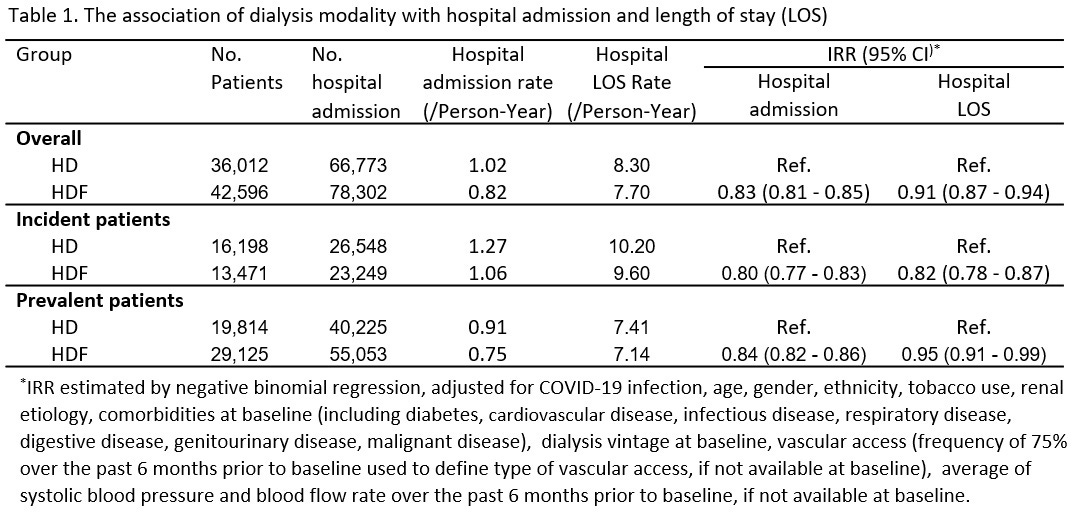
Baxter resumes dialysis solution production at its hurricane-hit facility
Baxter International has resumed production of dialysis and IV solutions at its North Cove facility in North Carolina, which was temporarily shut down due to hurricane-related flooding in September. The plant, responsible for 60% of the U.S. supply of IV fluids and peritoneal dialysis solutions, has restarted manufacturing at reduced capacity, with IV solution production reaching 85% of pre-hurricane levels. While progress is underway, Baxter cautions that returning to full production will take time. This follows earlier guidance to limit new dialysis patients due to supply constraints, highlighting the critical importance of the facility in maintaining U.S. dialysis care.
US Renal Care & Akebia enroll first patient in Vafseo (vadadustat) trial
Akebia Therapeutics has launched the VOICE trial to evaluate the safety and efficacy of Vafseo® (vadadustat) for treating anemia in chronic kidney disease (CKD) patients on dialysis. The trial will involve approximately 2,200 participants and compare thrice-weekly Vafseo dosing to standard erythropoiesis-stimulating agents. With its anticipated U.S. market launch in January 2025, Vafseo aims to align with dialysis schedules and potentially reduce hospitalizations while maintaining non-inferiority in all-cause mortality. This study marks a significant step in addressing CKD-related anemia.
Report: Bessemer’s 2024 State of Health Tech
Bessemer Venture Partners’ State of Health Tech 2024 highlights the resilience of the health tech sector amid ongoing challenges, showcasing recovery in private market deal-making and a surge of innovation in AI-driven healthcare solutions. With nearly 40% of new healthcare venture investments targeting AI, startups are rapidly achieving scale in areas like payer workflows, drug pricing transparency, and clinical augmentation. Bessemer highlights that 2025 will likely see accelerated adoption of these technologies as players across healthcare—facing profitability headwinds and regulatory shifts—embrace innovation to meet survival imperatives. These trends mark the next phase in health tech’s transformation, blending AI, transparency, and value-based care into scalable, efficient systems.
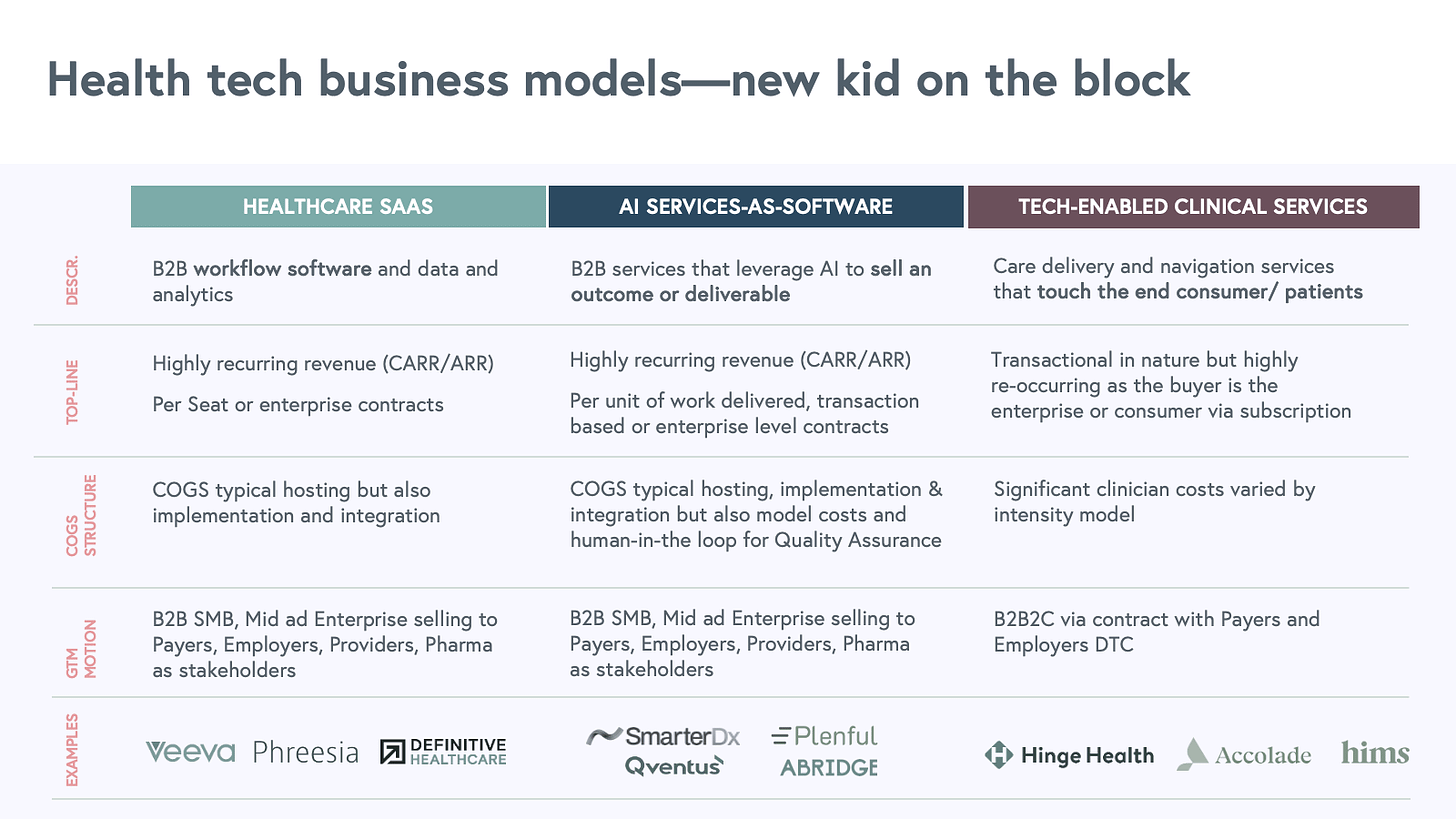
Venrock's 2025 Healthcare Predictions: Key Takeaways
Bob Kocher and Bryan Roberts expect a year of significant shifts driven by policy battles, technological evolution, and market forces. With legislative gridlock expected to continue, much of the action will shift to the courts, where challenges to CMS and FDA rulemaking will dominate the agenda. In the private sector, a rebound in at-risk primary care is anticipated following a challenging 2024, as risk-bearing providers streamline costs and adapt to new reimbursement models. Health tech is also poised for resurgence, with a wave of M&A activity and renewed IPO interest, though valuations are expected to remain lower than peak levels.
Meanwhile, artificial intelligence in healthcare may face a reckoning. While larger, established companies will integrate AI to boost efficiency and profitability, many standalone health tech AI startups are likely to struggle, proving better suited as features within broader solutions rather than standalone businesses. Venrock also anticipates continued innovation in areas like glucose monitoring, with companies like Apple leading the way, and a revival in cell therapy, particularly in solid tumor applications. Overall, 2025 promises to be a transformative year, with opportunities and challenges across policy, innovation, and market dynamics.
Carilion wants to start a kidney transplant program in Roanoke. State health officials, and UVa, oppose it.
Carilion's proposal to establish a kidney transplant program in Roanoke faces opposition from state health officials and the University of Virginia (UVa). Citing long travel times for Southwest Virginia residents, Carilion aims to enhance access to transplant services, projecting 30 transplants annually after initial ramp-up. However, the Virginia Department of Health’s Division of Certificate of Public Need recommended denying the application, raising concerns over Carilion’s recent regulatory compliance issues, the experience of its proposed lead surgeon, and the program's potential impact on UVa's established transplant services. UVa argues that organ availability, not geographic proximity, is the primary barrier to transplant care and that the program would divert resources from its robust operations. While some support letters highlight the potential to improve patient outcomes, the state health commissioner will make the final decision following a January fact-finding hearing.
There are 6 kidney transplant programs in Virginia: at Inova Fairfax Hospital, Henrico Doctors Hospital, Children’s Hospital of the King’s Daughters, VCU, Sentara Norfolk General and UVa.
Study: New model for replication of BKPyV virus, a major cause of kidney transplant failure
Researchers at the University of Alabama at Birmingham (UAB) have uncovered new details about BK polyomavirus (BKPyV) replication, a major cause of kidney transplant failure, which could pave the way for new treatments. Their study, published in PLOS Pathogens, reveals that BKPyV relies on host kidney cells to complete a round of DNA replication before producing the viral large tumor antigen (TAg), contrary to prior beliefs. Blocking this early host DNA replication could prevent viral production, offering a potential drug target to protect transplanted kidneys. This breakthrough highlights new avenues for antiviral strategies, as targeting host cell processes reduces the likelihood of viral resistance.

Study: Muscle matters: the effects of medically induced weight loss on skeletal muscle
GLP-1 receptor agonists, widely used for weight loss, have drawn attention for their potential to cause significant skeletal muscle loss, accounting for 25% to 39% of total weight lost over 36–72 weeks. While this muscle loss is linked to the magnitude of weight loss rather than a direct pharmacological effect, it far exceeds age-related muscle decline. Comparatively, non-pharmacological weight loss typically results in smaller proportions of muscle loss (10–30%). The findings underscore the need for clinicians to address concerns about muscle preservation to ensure patient adherence and optimize treatment plans.
Top 30 home care startups by funding source
Thomas Hagemeijer of TLGG Group highlights the growing potential of tech-enabled home care, citing Signify Health's "staggering growth" and European startups like Heim gaining traction. With aging populations straining traditional care systems, innovative solutions are addressing workforce shortages by optimizing efficiency through AI, automation, and self-care tools. Models like Signify’s focused visits for chronic conditions demonstrate scalable, impactful care delivery. Hagemeijer also notes that private equity, when responsibly applied, can accelerate holistic home care solutions, ensuring better outcomes while meeting critical societal needs.
Layoffs in medtech: These companies recently reduced their workforce
The medtech industry is ending the year with more layoffs— now over 22,000 job cuts reported since mid-2022. While companies like Boston Scientific and Intuitive Surgical have maintained strong revenue growth, others are facing operational challenges, supply chain disruptions, inflation, and economic pressures, including the downturn in China. Upcoming tariffs and regulatory changes under the incoming administration may add further uncertainties.
Study: Renal Response Associated with Greater Likelihood of Long-Term Renal Survival in People with Lupus Nephritis
A new study in Lupus Science & Medicine highlights the link between kidney response and long-term renal survival in lupus nephritis (LN) patients. Achieving modified primary efficacy renal response (mPERR) or modified complete renal response (mCRR) at 24 months significantly increased the likelihood of long-term kidney survival, with 78.9% of mPERR responders and 80.4% of mCRR responders showing improved outcomes. These findings suggest integrating mPERR and mCRR into clinical practice could enable earlier interventions, helping prevent irreversible kidney damage and end-stage renal disease. Further research is needed to refine the timing of response assessments.
Q&A: Standard-of-Care Shift in Advanced Kidney Cancer Introduces Questions for Some Patients
The standard treatment for advanced renal cell carcinoma (RCC) has shifted to a combination of tyrosine kinase inhibitors (TKIs) and immune checkpoint inhibitors, significantly improving outcomes. However, special considerations are necessary for older patients and those with renal insufficiency. Dr. Xin Gao of the Mass General Cancer Center highlights that while these therapies are not dose-dependent on kidney function, careful monitoring of renal health and individual patient conditions is essential. TKI monotherapy remains an option for select cases, such as patients with favorable-risk RCC or contraindications to immunotherapy. Adverse events often depend on individual resilience rather than age alone, underscoring the importance of personalized treatment approaches for managing RCC in these populations.
Study: Monitoring individualized glucose levels predicts risk for bradycardia in type 2 diabetes patients with CKD
A pilot study exploring the link between glucose levels and bradycardia in patients with type 2 diabetes (T2D) and chronic kidney disease (CKD) revealed significant associations. Using interstitial glucose (IG) and ECG monitoring over 7 days, researchers identified a higher frequency of bradycardia episodes during low relative glucose periods, particularly in specific time windows. The study achieved a high predictive accuracy (AUC 0.94) for bradyarrhythmias using glucose and heart rate variability features, challenging the traditional definition of hypoglycemia by finding that only 4% of bradycardia episodes occurred at glucose levels below 70 mg/dL. These findings underscore the importance of personalized glucose monitoring in predicting cardiac risks for this high-risk population.
Study: Chocolate intake and risk of type 2 diabetes: prospective cohort studies 🍫
A recent study leveraging data from three large cohort studies suggests that higher dark chocolate consumption may lower the risk of type 2 diabetes (T2D). Participants consuming at least five servings of dark chocolate per week experienced a 21% lower risk of T2D, with a linear reduction of 3% per additional weekly serving. Interestingly, milk chocolate showed no significant T2D risk reduction and was linked to long-term weight gain.
Community Voices
A collection of insights, opinions, updates and upcoming events from your peers and fellow explorers across the Kidneyverse.
No-cost heart & kidney screening Dec 7-9 in Tampa: Care Access is offering free heart and kidney health screenings in Tampa from December 7-9 at IMA Medical Clinic of North Dale Mabry. These screenings will include testing for diabetes, high cholesterol, and lipoprotein(a) (Lp(a)), a significant but lesser-known cardiovascular risk factor that impacts one in five people. Participants will also receive educational resources on heart and kidney health and opportunities to engage in clinical research aimed at advancing treatments for Lp(a) and related conditions. Walk-ins are welcome, but scheduling is recommended at MyFreeHeartTest.com.
Tillamook Kidney Center opens soon: The reopening of the Tillamook Kidney Center brings life-saving dialysis care back to Tillamook, Oregon, ending the need for patients to travel long distances. Managed by Dialysis Clinics Incorporated (DCI), the center will operate three days a week, offer a home dialysis program, and benefit from strong community partnerships, including rent-free clinic space and shared staffing from Adventist Health. Despite a projected financial deficit, support from DCI’s foundations, profitable centers elsewhere, Adventist, Medicare, and local fundraising will help sustain operations. Dr. Claire Kassakian of Northwest Renal Clinic, the new medical director, described the reopening as a significant and emotional milestone, while patients expressed relief and gratitude for the return of local care.
“At the end of the day what we’re really trying to do is take care of our friends and family in our community,” Swanson said. “That’s the advantage of rural healthcare, you’re taking care of your friends and family.”
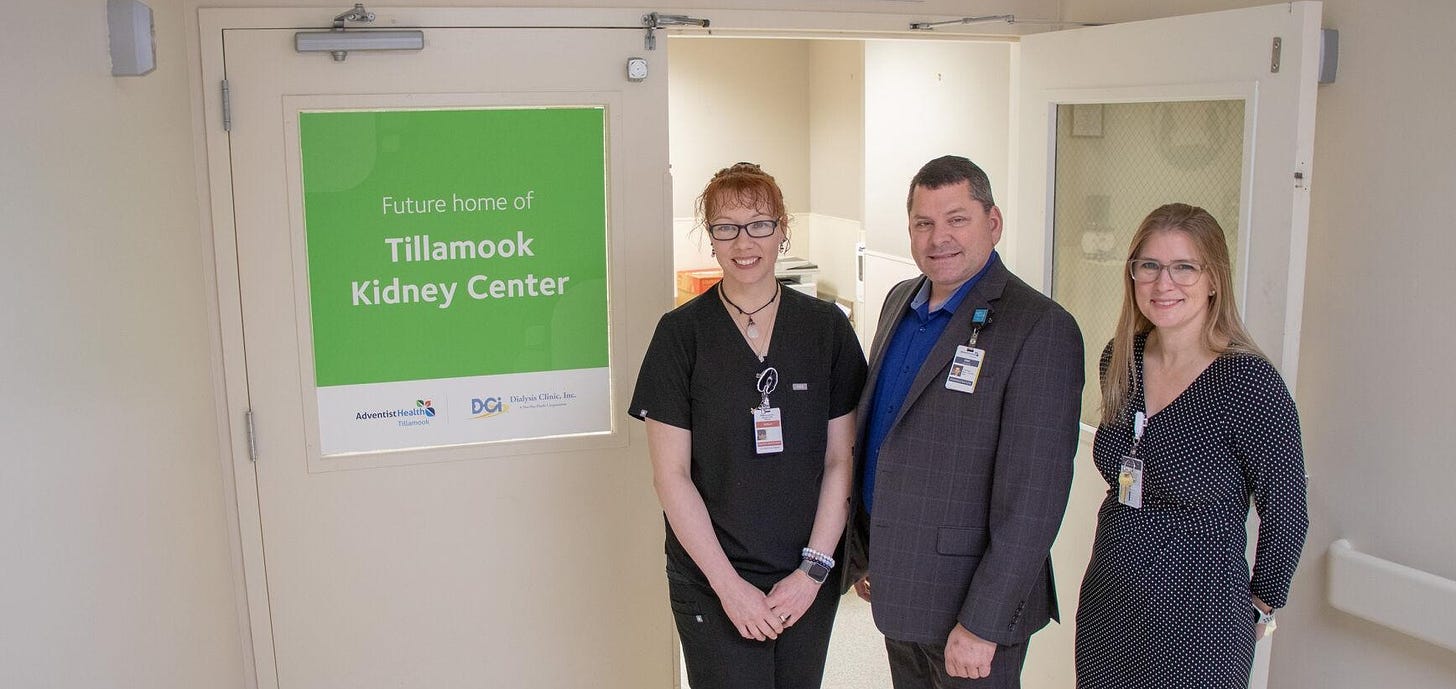
John Erbey: Chronic kidney disease is a growing global challenge, but innovation is opening new doors. From advanced dialysis systems and bioengineered kidneys to breakthroughs in xenotransplantation, we’re witnessing a transformation in how we manage kidney health. I’m proud to share my insights, where I explore these exciting advancements and how they’re reshaping outcomes for patients worldwide. Together, we can create a future where kidney care is smarter, more efficient, and less invasive.
Dr. Bill Frist: Last night we celebrated the incredible milestone of the 2000th heart transplant at the Vanderbilt Transplant Center. What was once a seed of an idea 30+ years ago is now the busiest heart transplant center in the world. Wonderful to see old friends, colleagues and patients.
Davide Garrisi: “…In today's clinical development it is really exciting to see how the race to the next blockbuster is becoming more and more competitive, fostered by daily press releases - the last one just when I am writing about Zepbound vs Wegovy. And talking about news and press releases, we also appraised very recently the perceived market importance of the double-digit % weight reduction at 1/3 months as the main success indicator in this race.
Along with the enthusiasm for the short-term wins of weight reduction, more and more publications in literature are shifting their attention towards the long-term effects of weight reduction and chronic weight management drugs on body mass composition...”Scott Nelson: “Over the past 18 months, Medtech has cut 14,000 people.
In 2025, things will still be rough, however signs are pointing to increased investments/ acquisitions with falling interest rates and an expectation of increased IPO activity per Reuters. Recent large investments across digital health and data analytics covered by Fierce Healthcare. And Medline Industries just announced a planned public offering next year to raise up to $5B. Bottom line:
Our MedTech markets— as exciting as they may be, are never really stable— we all need to look out for each other.”
International Society of Glomerular Disease: Registration and abstract submissions open on Tuesday Dec 10 for the 2025 International Podocyte Conference happening June 10-13 in Hamburg.
Neil G.: Awesome day at Heart House in Washington DC to talk about doing better for our patients! Many thanks to the American College of Cardiology for inviting US Heart and Vascular to the Value Based Care Forum. Fantastic opportunity to converse with leaders from government, health systems, private practices, and payors to discuss the challenges around VBC and how we think about the barriers. Fundamental problems have to be tackled: prioritizing patient access to outpatient care, avoiding unnecessary ER visits, and eliminating low-value care. The planning committee did a great job!
Made Possible By
Signals is made possible with the generous support of our sponsors. We are grateful to partner with organizations committed to advancing kidney care and innovation: Roivios, 3iveLabs, Dialysis Education Services, and IKONA.
Join our NEW slack channels. 🔐 We continue to hear feedback from dozens of you who want access to more data, more expert perspectives, and more ways to connect with one another. Our new slack community is a great way to connect with industry peers, engage in expert-led discussions, and gain access to channels focused on kidney health topics like early CKD, transplantation, home dialysis, vascular access, dialysis devices, value-based care, and more.
Become a supporting sponsor 📣: Now accepting applications from mission-aligned companies looking to get in front of 12,000+ monthly readers— clinicians, patients, industry leaders, researchers, policymakers, decision makers and investors.
Kidneyverse Careers Job Board 💼: Explore top job opportunities across kidney care, from startups to established industry players. Whether you're hiring or looking for your next move, Kidneyverse Careers is the place to connect with top talent and cutting-edge companies.
###

![Signals From [Space]](https://substackcdn.com/image/fetch/e_trim:10:white/e_trim:10:transparent/h_72,c_limit,f_auto,q_auto:good,fl_progressive:steep/https%3A%2F%2Fsubstack-post-media.s3.amazonaws.com%2Fpublic%2Fimages%2F4d588ac1-7fac-4bd4-829d-fc7b4e8f1326_1512x288.png)

![Signals From [Space]](https://substackcdn.com/image/fetch/w_36,h_36,c_fill,f_auto,q_auto:good,fl_progressive:steep,g_auto/https%3A%2F%2Fsubstack-post-media.s3.amazonaws.com%2Fpublic%2Fimages%2F55686857-6b99-45a6-ac0f-09c9f023f2a0_500x500.png)

